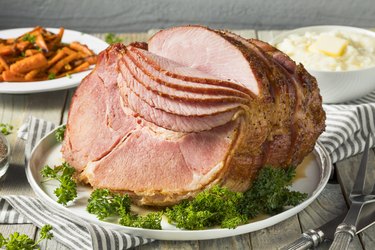
As its name makes clear, a semi-boneless ham has some bones in place — and also some bones removed.
"Unless you are a butcher or very familiar with pork anatomy, you will have a hard time getting a good yield from a fully bone-in ham," says Shawn Matijevich, lead chef for online culinary arts and food operations at the Institute of Culinary Education.
Video of the Day
Video of the Day
Opt for a semi-boneless ham instead of bone-in, and the leg bone will still be in place, but the hip and shank bones will be removed, says David Rose, executive chef at Omaha Steaks. "The leg bone keeps the ham juicier and is easier to carve, too."
Nearly all semi-boneless hams will be precooked when you buy them. That means you can go ahead and enjoy it cold so long as it's vacuum-packaged and prepared in a federally inspected plant, according to the USDA.
That being said, you can bake a fully-cooked semi-boneless ham in a way that makes it juicy and flavorful for the perfect dinner. The best part is, it won't take long and you'll have ham leftovers for other recipes that will last for days.
To do it, follow the steps below.
Tip
Make sure to read the packaging label to ensure that your ham is fully-cooked before planning your meal.
To reheat your fully-cooked ham, cook it until it reaches an internal temperature of 140 degrees Fahrenheit, per the USDA. Use a meat thermometer to check.
Uncooked ham must reach an internal temperature of 160 F when cooked in order to be safe to eat.
Baked Semi-Boneless Ham Recipe
Things You'll Need
Fully cooked, semi-boneless ham
Roasting pan or Dutch oven
Small, sharp knife (optional, for scoring)
Carrots, chopped (optional)
Celery, chopped (optional)
Onions, chopped (optional)
Water or another liquid (soda, stock or beer)
Aluminum foil
Meat thermometer
Mixing bowl (optional)
Glaze ingredients (optional)
Basting brush
Serving platter
Carving knife
1. Remove the Ham
Take the ham out of the refrigerator about an hour before you plan to place it in the oven, says Chef Brandon Collins, mustard sommelier for Maille.
2. Preheat the Oven
Preheat the oven to 325 degrees Fahrenheit.
3. Prepare the Ham for Baking
Place the ham in a large roasting pan, or alternatively, in a Dutch oven.
If the ham has a sufficient layer of fat, use a small, sharp knife to score the fat in a diamond pattern, Rose says.
Tip
You can place your ham on top of chopped mirepoix (a mix of diced carrots, onions and celery), Collins says. “This adds flavor and raises the ham from the bottom of the pan and keeps it elevated while cooking, so the bottom doesn't boil in the liquid while the top dries out.”
4. Add Liquid
Pour your liquid in the bottom of the pan so it's 1/4 inch deep. You can use water, or try one of these options Collins suggests:
- Dark beer
- Chicken or pork stock
- Soda, such as root beer, ginger ale or lemon-lime varieties
5. Cover the Ham
Tent the ham with aluminum foil, Rose says. You want the aluminum foil to fit over the pan loosely so some steam can escape.
6. Bake the Ham
Place the ham in the oven and let it bake. It'll take roughly 18 to 22 minutes per pound to cook, Rose says. So, a five-pound ham will take between 90 and 110 minutes to reheat.
7. Prepare Your Glaze (Optional)
You do not need to prepare a glaze for your ham. But, doing so will make it more delicious. A glaze, which is typically sweet, counteracts ham's saltiness.
There are many options when it comes to glazing a ham. Here are a couple of ideas to get you started:
- Rum and Coca-Cola glaze: combine 3/4 cup each of dark spiced rum and Coca-Cola with 1 cup of Polaner Cherry Spreadable Fruit, 2 tablespoons Worcestershire sauce, 1 tablespoon Dijon mustard and 1/4 teaspoon kosher salt in a medium-sized saucepan, Rose says. Whisk to combine the ingredients. Bring to a boil, then reduce the temperature until the glaze reaches a simmer. Simmer for 10 minutes, then remove from the heat and cool the mixture to room temperature.
- Brown sugar and mustard glaze: Combine brown sugar, spices (such as paprika, cumin, black pepper and garlic powder) with a tangy mustard like Maille Dijon Originale and some liquid in a medium saucepan, Collins says. Bring the mixture to a boil, then reduce to a simmer and let it cook for 10 minutes. Remove from the heat and let it cool before glazing.
8. Remove Foil and Glaze Your Ham (Optional)
Remove the foil in the last hour of baking. Apply your glaze (if you're using one) every 15 minutes with a basting brush, Rose says.
Tip
Do not baste the ham with the drippings that accumulate in the bottom of the pan, as they can make the ham too salty.
9. Rest and Serve
Remove the ham from the oven once it reaches an internal temperature of 140 F, using a meat thermometer to check for doneness. Technically, you don't need to let cooked ham rest before slicing and serving it.
That said, Collins suggests that you let your ham rest for 20 minutes to allow all the flavors to soak into the meat. Once that time is up, transfer the ham to a serving platter, carve and serve.
Was this article helpful?
150 Characters Max
0/150
Thank you for sharing!
Thank you for your feedback!